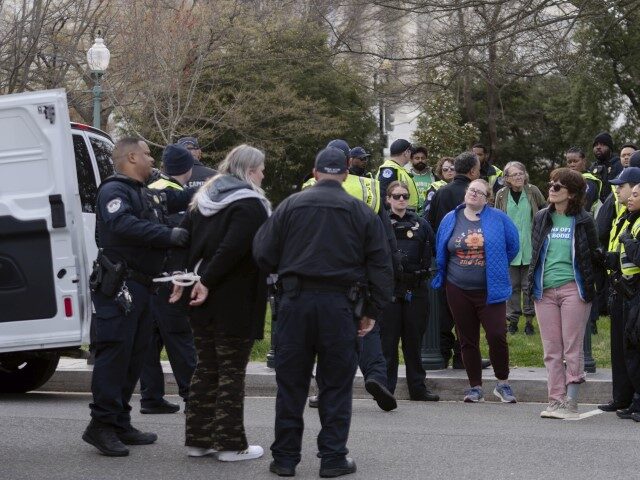Thirteen pro-abortion protesters were arrested outside the Supreme Court on Tuesday morning, ahead of oral arguments in a case that could have a significant impact on how mifepristone — the first drug used in a two-drug medication abortion regimen — is used and prescribed in the United States.
U.S. Capitol Police arrested 13 people at around 8:45 a.m. EDT, the Hill reported. A police spokesperson told the outlet the activists were “illegally blocking the roads and then a walkway.”
The spokesperson added that officers had warned the individuals to stop “blocking the walkway or they would be arrested.”
“They refused, so our officers arrested them,” the spokesperson said, citing crowding, obstructing, or incommoding as possible offenses.
The activists who were arrested are affiliated with pro-abortion groups, including The Center for Popular Democracy and Women’s March, according to the report. The two groups had worked together to organize a rally ahead of oral arguments, a Women’s March spokesperson told the outlet.
Rachel O’Leary Carmona, executive director of the Women’s March, was among the 13 people who were arrested, and “described the arrest as a purposeful act of resistance,” according to the report.
“This morning, we put our bodies on the line to shine a light on how this totally illegitimate court case could strip millions of women of their rights to make decisions about what is best for their bodies and their families – and we were arrested,” Carmona said in a statement provided through the spokesperson.
Real men protect our most vulnerable, not whatever this is.#WomensHealthMatters pic.twitter.com/Ie0JvPEncu
— SBA Pro-Life America (@sbaprolife) March 26, 2024
“The reality is that this case is personal, and we took it as such. We could not just stand by while our rights to bodily autonomy are potentially revoked by radical politicians and a Supreme Court captured by their agenda,” she claimed. “We will continue to resist and work to enshrine bodily freedoms, no matter the consequences. There is too much at stake for women not to.”
Photos from #SCOTUS yesterday. 📸
Thank you to all who showed up to stand up for the safety and health of mothers and preborn babies!
We will continue to fight against Chemical Abortion Pills for as long as it takes.💗 pic.twitter.com/iQhftQaHiF
— Students for Life of America | Pro-Life Gen (@StudentsforLife) March 27, 2024
The Supreme Court case drew hundreds of people, both pro-abortion and pro-life. The occasion was momentous as the High Court gathered to hear an abortion case nearly two years after justices overturned its 1973 Roe v. Wade decision in Dobbs and returned the issue of abortion to individual states.
“Four of my siblings were aborted. Choose Life.” pic.twitter.com/FLo6Oq5o9l
— Students for Life of America | Pro-Life Gen (@StudentsforLife) January 20, 2024
The case, FDA v. Alliance for Hippocratic Medicine, surrounds the U.S. Food and Drug Administration’s (FDA) rolling back of safety restrictions for mifepristone. Those restrictions include its 2016 actions extending the permissible gestational age of the baby for which a girl or woman may take abortion drugs from seven weeks’ gestation to ten weeks’ gestation, its elimination of requiring prescribers to report non-fatal complications from the drug, and its 2021 rule change allowing abortionists to send mifepristone through the mail. The FDA also recently made permanent its rule to allow women and girls to receive a prescription for mifepristone via telemedicine.
The Alliance Defending Freedom (ADF) filed the lawsuit in November of 2022 against the FDA on behalf of four national medical associations and several doctors, alleging the agency “chose politics over science and approved chemical abortion drugs for use in the United States” and asking the court to restore the 2016 and 2021 regulations.
“I ended up on the bathroom floor covered in pools of blood wondering if I was going to die. We’re here today to ask the Supreme Court to make the FDA do its job and protect women.” — Elizabeth Gillette
The FDA put politics before safety and gambled with countless lives.… pic.twitter.com/TqpFfLejuM
— SBA Pro-Life America (@sbaprolife) March 26, 2024
The initial ADF lawsuit contained several other allegations, including that the FDA was only able to approve mifepristone in 2000 by falsely classifying pregnancy as an “illness.” The Supreme Court declined to take up an appeal from the ADF asking justices to rule on the legality of the FDA’s 2000 approval of mifepristone, which could have potentially taken the drug off the market.
How Does Mifepristone Work?
In a medication abortion, mifepristone blocks the action of progesterone, which the mother’s body produces to nourish the pregnancy. When progesterone is blocked, the lining of the mother’s uterus deteriorates, and blood and nourishment are cut off to the developing baby, who then dies inside the mother’s womb. The drug misoprostol (also called Cytotec) then causes contractions and bleeding to expel the baby from the mother’s uterus.
Last week, the pro-abortion Guttmacher Institute released a report which found that medication abortions accounted for 63 percent of all abortions within the formal U.S. health care system in 2023 after the Supreme Court overturned Roe v. Wade — meaning an estimated 642,700 unborn babies died in medication abortions. The percentage is up from an estimated 53 percent in 2020 and 39 percent in 2017. The report did not account for abortion pills obtained through underground national and international networks, including those that send pills to women in pro-life states.
The case is FDA v. Alliance for Hippocratic Medicine, No. 23-235 in the Supreme Court of the United States.
Katherine Hamilton is a political reporter for Breitbart News. You can follow her on X @thekat_hamilton.

COMMENTS
Please let us know if you're having issues with commenting.